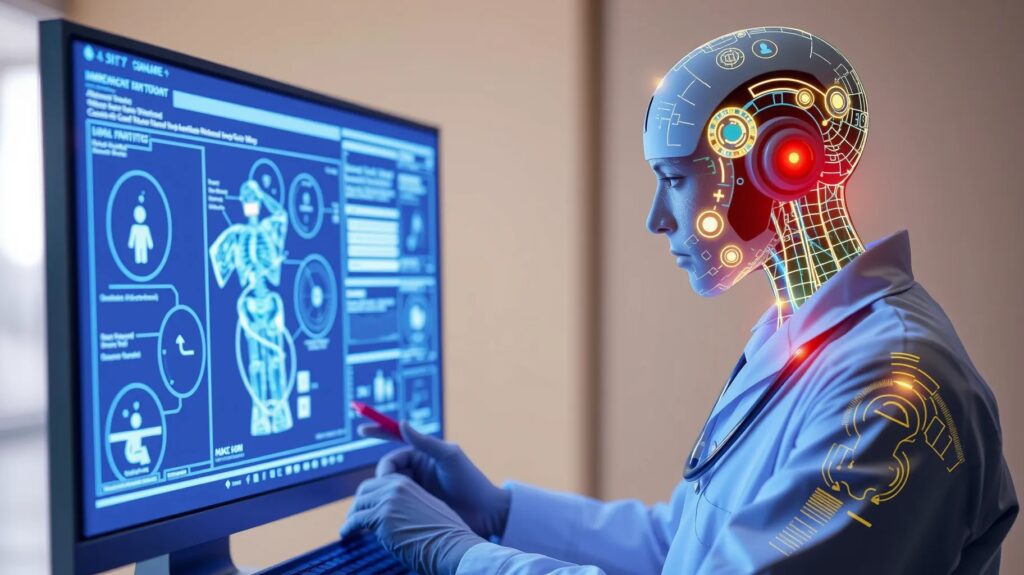
The Rise of Contextual AI in Healthcare
Unlike traditional AI systems that analyze data in isolation, contextual AI considers real-time factors like patient history, environmental conditions, and even emotions.
This new form of AI is stepping into the spotlight as it offers more precise, efficient, and tailored medical solutions.
And it’s not just hype. From diagnostics to treatment plans, contextual AI is radically reshaping healthcare as we know it. Hospitals, clinics, and medical professionals are already leveraging its capabilities to streamline patient care and improve outcomes.
What Makes Contextual AI Different?
So, what sets contextual AI apart from other types of artificial intelligence? One key difference lies in its ability to understand context. Instead of focusing solely on raw data, it takes into account a wide variety of factors, like a patient’s lifestyle, social circumstances, and medical history.
This helps healthcare providers make better, more informed decisions.
By considering these “human” factors, contextual AI brings empathy into the mix. It doesn’t just process data like a machine—it “thinks” like a clinician who understands that two people with the same symptoms may need completely different treatments.
Personalized Patient Care with AI Precision
Imagine walking into a doctor’s office, and before you even sit down, the system already has a precise idea of your health needs. That’s what contextual AI promises. By analyzing multiple data points in real-time, AI can suggest treatments specifically designed for you—not just someone with similar symptoms.
Personalization in healthcare has always been the goal, but it’s historically been hard to achieve. Contextual AI can make this a reality by predicting which medications will work best, anticipating complications, and even adjusting lifestyle recommendations based on your unique background.
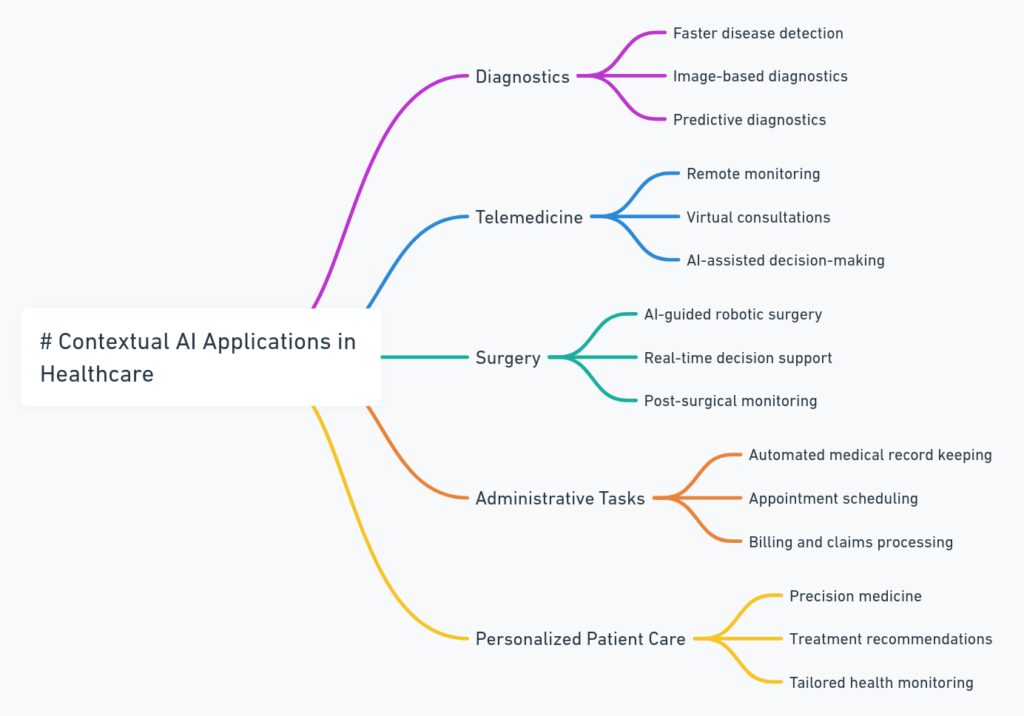
It’s about creating treatment plans that evolve with the patient.
Revolutionizing Diagnostics: Faster and Smarter
Diagnostics is one of the most exciting areas where contextual AI is making strides. Traditional diagnostics often rely on a series of tests that take time—sometimes too much time. But with AI-powered diagnostics, doctors can get results faster without sacrificing accuracy.
AI algorithms can sift through large datasets in seconds, pinpointing anomalies or conditions that could take human doctors much longer to find. By adding the context of a patient’s overall health, contextual AI can provide even more accurate diagnoses, speeding up treatments and saving lives.
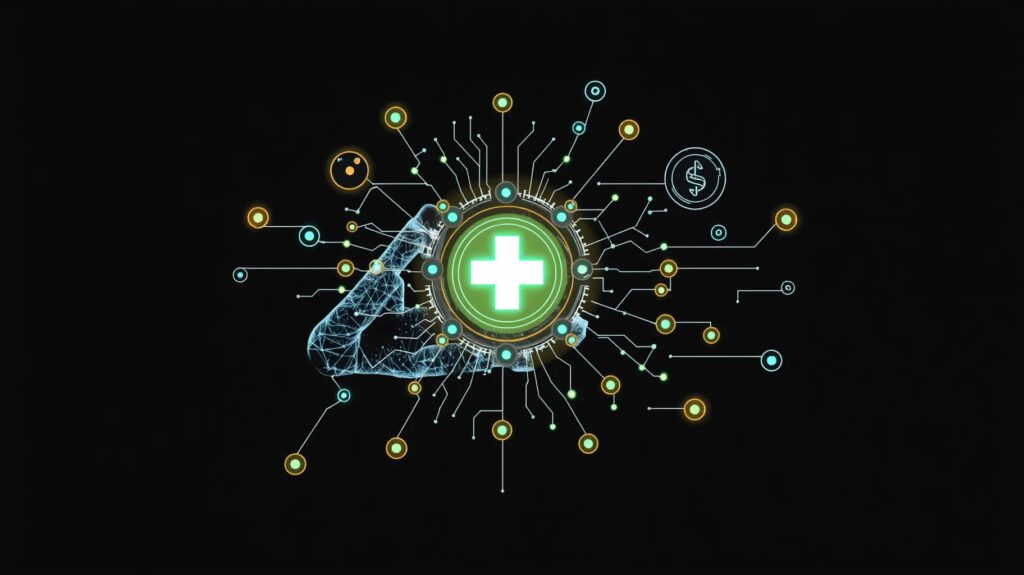
Take radiology as an example. AI can now analyze medical images with stunning accuracy, helping radiologists detect early signs of diseases like cancer that might be missed by the human eye.
The power of AI doesn’t stop at faster diagnosis, though; it can predict how diseases might progress, allowing for proactive treatments rather than reactive care.
Enhancing Doctor-Patient Communication
Clear communication is the cornerstone of good medical care, yet it’s one area where healthcare often falls short. Whether it’s due to a lack of time or overwhelming medical jargon, patients can feel confused about their diagnosis or treatment plan. But contextual AI is helping bridge that gap.
AI can act as a translator, breaking down complex medical terms into easy-to-understand language tailored to each patient’s level of comprehension. It also helps doctors by providing suggestions on how to communicate more effectively based on the patient’s emotional state or preferences.
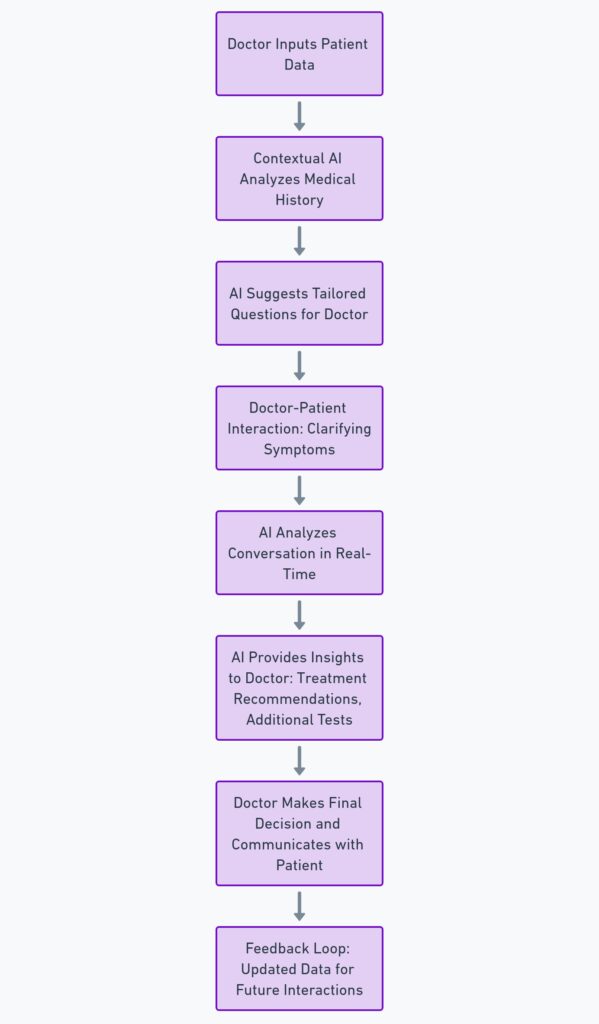
Moreover, chatbots powered by contextual AI are becoming common in telemedicine, helping patients ask follow-up questions or get clarification long after they leave the clinic.
How AI is Shaping Real-Time Medical Decisions
In life-or-death situations, every second counts. Contextual AI can assist medical professionals in making faster, better decisions in real-time by providing relevant data at the moment they need it.
Imagine a surgeon performing a complex operation and having immediate access to predictive models based on the patient’s data. Real-time AI could suggest adjustments or flag potential issues before they become critical, helping the surgeon stay one step ahead. This capability makes real-time AI invaluable in high-pressure environments like emergency rooms and operating theaters.
AI can predict patient deterioration, suggest interventions, or monitor vital signs, all in real-time. These advancements help doctors take a more proactive approach, ensuring that even the smallest signs of trouble are addressed before they escalate.
Contextual AI in Surgery: Improving Precision
Surgical procedures, especially complex ones, require not only skill but also access to the right information at the right time. This is where contextual AI shines. With the ability to integrate patient data, imaging scans, and real-time sensor feedback, AI assists surgeons in making minute adjustments during the procedure.
Take robotic-assisted surgeries, for instance. AI-powered systems can provide surgeons with greater precision by guiding robotic instruments with unparalleled accuracy. Surgeons remain in control, but AI augments their capabilities, reducing the risk of complications and improving overall outcomes.

Contextual AI also learns from past surgeries, continually improving its recommendations based on both individual and collective experiences in the operating room.
Better Outcomes with Predictive Analytics
Predictive analytics is another area where contextual AI is making a huge difference. By analyzing patient data along with environmental and social factors, AI systems can forecast potential health issues long before they manifest. This allows healthcare providers to intervene early, significantly improving patient outcomes.
For instance, AI can predict which patients are at risk of developing chronic conditions like diabetes or heart disease. This proactive approach not only improves health but also reduces long-term healthcare costs. Hospitals and clinics can use this data to tailor preventative measures for high-risk populations, keeping them healthier for longer.
Streamlining Administrative Work with AI
Healthcare professionals often spend an enormous amount of time on administrative tasks, from filling out paperwork to processing insurance claims. Contextual AI is helping to reduce this burden by automating much of the process.
AI can scan and organize patient records, schedule appointments, and even handle billing, allowing doctors and nurses to focus more on patient care. By streamlining administrative workflows, contextual AI helps improve efficiency across the healthcare system.
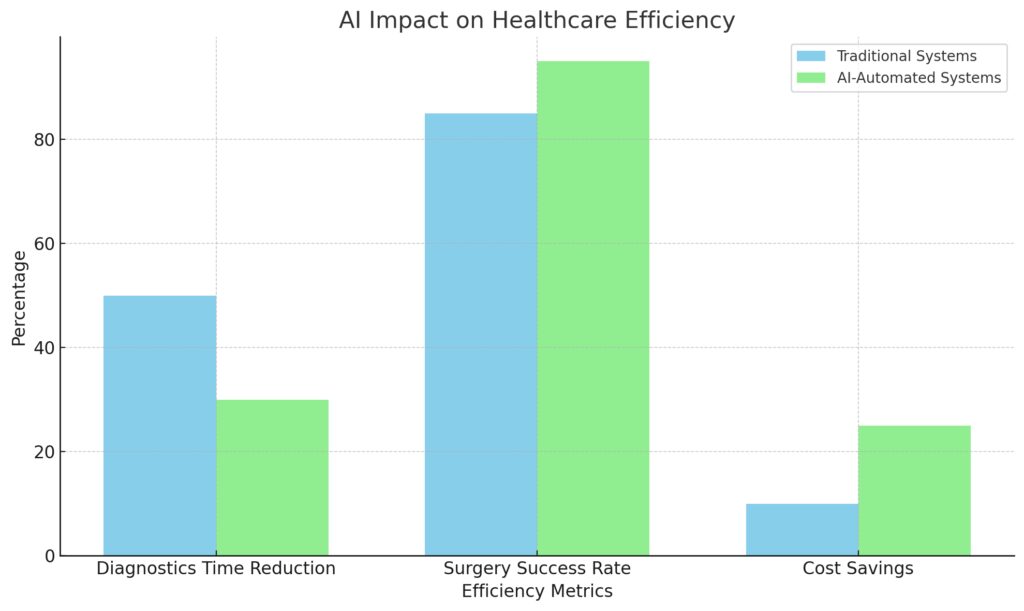
It’s estimated that AI automation could save healthcare providers billions by reducing time spent on repetitive tasks, minimizing human error, and speeding up the processing of medical claims.
Privacy and Ethical Concerns: Balancing Innovation
With all the incredible advancements that contextual AI brings to healthcare, it’s important to address the privacy and ethical challenges that come with it. After all, patient data privacy is a critical concern in today’s digital age.
AI systems need access to vast amounts of personal information to function effectively, which raises concerns about who controls this data and how it’s used. There’s also the question of bias—AI systems, if not carefully designed, can inherit and perpetuate biases present in the data they learn from.
Healthcare providers and developers need to work together to ensure that AI tools are built and implemented responsibly, with robust privacy protections and ethical guidelines in place to prevent misuse.
AI-Assisted Drug Development: A New Frontier
One of the most groundbreaking applications of contextual AI in healthcare is its role in accelerating drug development. Traditionally, bringing a new drug to market could take years, if not decades, due to the lengthy processes involved in research, trials, and approval. But AI is speeding this up, making drug development smarter and more efficient.
Contextual AI analyzes massive datasets—from genetic information to previous drug trial results—identifying patterns that human researchers might miss. It can also simulate how a drug will interact with the human body, cutting down the need for as many real-world trials.
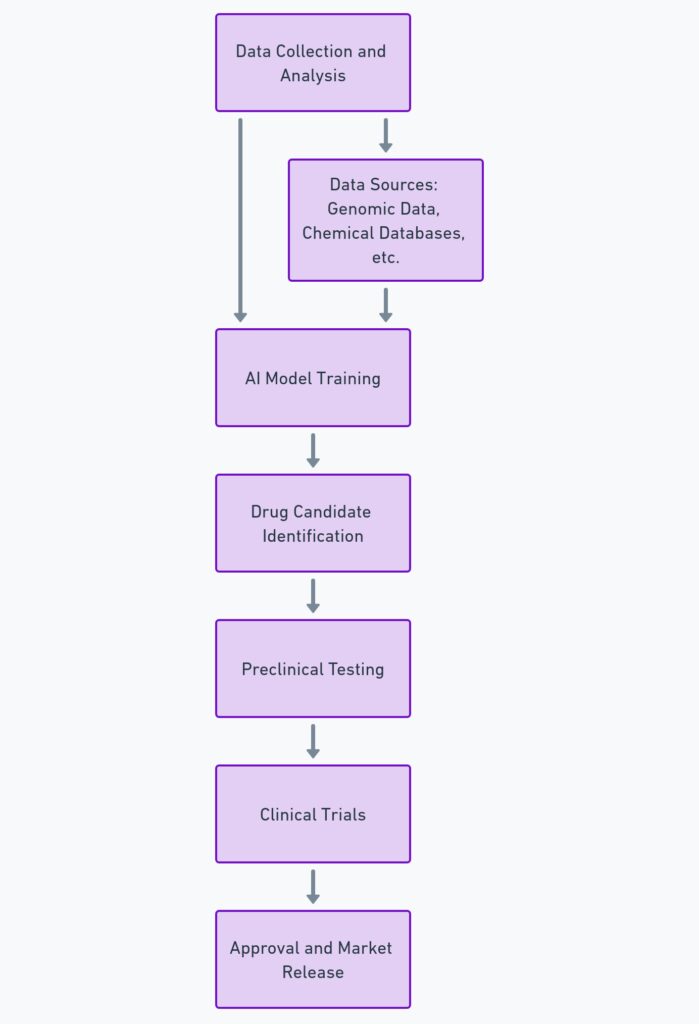
In fact, AI-assisted drug discovery recently helped develop treatments for conditions like Alzheimer’s and cancer at a pace that was once thought impossible. The ability of AI to predict molecular behavior opens up countless possibilities for treating diseases more effectively.
Remote Monitoring and Telemedicine: AI’s Role
Telemedicine has skyrocketed in recent years, especially with the rise of remote work and global health crises like COVID-19. In this context, AI is playing an integral role in remote monitoring of patients, allowing doctors to stay connected with their patients even when they’re miles apart.
With the help of wearable devices, AI can track vital signs like heart rate, oxygen levels, and even sleep patterns in real-time. This data is then fed back to healthcare providers who can assess the patient’s condition and intervene if something goes wrong.
For patients with chronic conditions, this kind of AI-powered remote monitoring is a game-changer. It not only keeps them out of the hospital but also ensures that they receive timely care when needed. This has the potential to reduce hospital readmission rates and improve quality of life for patients worldwide.
The Future of AI in Healthcare: Beyond the Hype
While there’s no doubt that AI is revolutionizing healthcare, it’s essential to separate the hype from the reality. Not every AI solution is a silver bullet, and some technologies still need time to mature before they can fully integrate into medical practice.
The good news is that healthcare professionals are starting to embrace AI as a valuable tool rather than a replacement. In the future, we’ll likely see AI being used alongside human doctors, enhancing their ability to diagnose, treat, and care for patients. Collaboration between AI and healthcare providers will lead to even greater breakthroughs in medical science.
But for AI to realize its full potential in healthcare, issues like regulatory approval, ethical use, and privacy must be addressed first.
How Contextual AI Benefits Healthcare Professionals
Healthcare isn’t just about the patients—it’s also about the doctors, nurses, and specialists who keep the system running. Contextual AI can make their jobs easier by providing real-time insights, automating mundane tasks, and helping with decision-making.
For example, when doctors are inundated with patient data, contextual AI can sift through it to deliver the most critical information upfront. It also allows healthcare professionals to focus more on patient care by handling routine tasks like scheduling or lab result analysis.
What’s more, AI provides continuing education opportunities for doctors by keeping them updated with the latest research and medical breakthroughs. In this way, it’s not just improving patient outcomes—it’s also helping professionals stay sharp and informed.
Tackling Healthcare Inequality with AI Solutions
Healthcare inequality is a significant problem around the world. Many patients, particularly those in rural or underserved areas, lack access to the kind of care they need. Contextual AI could be a solution to this issue.
AI’s ability to operate remotely means that patients in hard-to-reach areas can receive quality care without needing to travel long distances. From telemedicine to AI-powered diagnostics, these tools can bridge the gap between healthcare providers and underserved populations.
Additionally, AI-driven platforms can help identify patterns in healthcare inequality, giving governments and healthcare organizations the data they need to address these disparities more effectively. The hope is that, in the future, AI can help bring healthcare to everyone, regardless of location or socioeconomic status.
AI’s Role in Combating Global Health Crises
In recent years, global health crises like the COVID-19 pandemic have highlighted the importance of AI in responding to emergencies. AI-powered tools have been used to track the spread of disease, model future outbreaks, and even help develop vaccines faster than ever before.
During the pandemic, AI helped hospitals manage overwhelming numbers of patients by predicting which individuals were at higher risk for severe symptoms. It also aided in resource distribution, ensuring that hospitals had enough ventilators, PPE, and staff to handle the influx of cases.
As we prepare for future health crises, AI-driven technologies will be crucial in helping us respond more effectively. From vaccine development to global monitoring, AI’s role in managing public health emergencies cannot be overstated.
Can Contextual AI Overcome the Challenges?
Despite all the benefits, contextual AI in healthcare faces some notable challenges. For starters, there’s the issue of data privacy, as AI systems need access to vast amounts of sensitive patient data to function effectively. Striking the right balance between innovation and privacy is crucial for the future of AI in healthcare.
Additionally, AI tools can sometimes suffer from bias if they are trained on incomplete or skewed datasets. This could lead to less accurate diagnoses or treatments, particularly for underrepresented groups. Ensuring that AI systems are trained on diverse, high-quality data is essential for overcoming this obstacle.
Lastly, the regulatory landscape around AI in healthcare is still evolving. New technologies often outpace regulations, meaning healthcare providers and developers must navigate a complex legal environment to ensure compliance and safety.
Nonetheless, if these challenges are addressed, contextual AI has the potential to revolutionize healthcare for generations to come. With the right safeguards in place, the future of AI in medicine is bright.
AI in Healthcare: Revolutionizing Precision and Personalization
From diagnostics to surgery, contextual AI has already begun to reshape healthcare, delivering more personalized, efficient, and accurate treatments. As AI continues to evolve, its influence on every aspect of medicine will only deepen, offering better outcomes for patients and improved efficiency for healthcare providers. However, as with any emerging technology, it’s essential to address the ethical, regulatory, and privacy challenges that come with it.
For now, the future of AI in healthcare looks promising, and it’s only a matter of time before it becomes a cornerstone of modern medicine, revolutionizing the way we approach patient care and medical innovation on a global scale.
Resources
- World Health Organization (WHO) – Digital Health
- The WHO explores the role of AI and digital health in improving global health outcomes. Their reports provide insights into the ethical use of AI in healthcare and the potential of digital technologies.
- WHO Digital Health Overview
- Harvard Business Review – AI in Healthcare
- Harvard Business Review frequently publishes articles on how AI is transforming various industries, including healthcare. Their analysis covers both the benefits and challenges of implementing AI in medical settings.
- Harvard Business Review on AI in Healthcare
- Stanford University – AI in Medicine
- Stanford’s AI in Medicine program offers cutting-edge research on the application of AI in diagnostics, patient care, and more. It’s an excellent resource for those interested in the latest academic research on AI innovations.
- Stanford AI in Medicine
- The Lancet – AI and Machine Learning in Healthcare
- One of the world’s leading medical journals, The Lancet, publishes peer-reviewed research on the use of AI in healthcare, discussing real-world applications, successes, and ethical concerns.
- The Lancet AI Articles